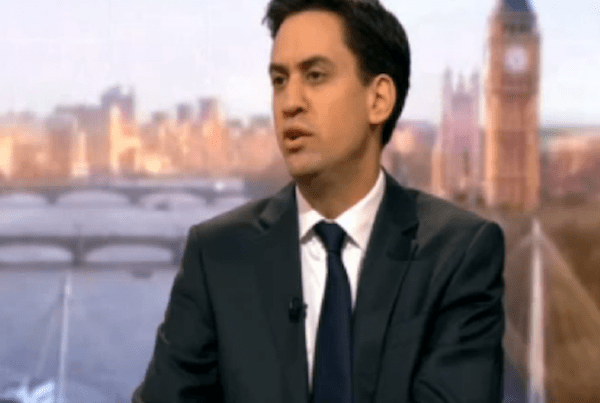Refusing to publish your 2015 manifesto at the start of 2013 is, obviously, a sensible one. However uncomfortable Labour frontbenchers have felt over the past two and a half years about not being able to respond to the jeers of ‘well, what would you do then?’ from ministers at departmental questions, writing another one of the longest suicide notes in history would have left them in still greater discomfort at the polls. But how do voters know whether to trust you or not when they’ve only recently booted you out of government?
Ed Miliband was trying to explain this tension to James Landale on Marr this morning.
Miliband: But, James, I’ve tried to explain to you why it isn’t reasonable for an opposition at this stage of a parliament to set out precisely what will be in the manifesto. I’m happy to come back on the programme and talk about our manifesto when we publish our manifesto.
Landale: You could be Prime Minister in two years’ time.
Miliband: Exactly, exactly.
Landale: If that’s what the British electorate vote.
Miliband: Exactly.
Landale: And yet there’s this gap, there’s this gaping lacuna with the electorate not knowing what you’re really going to promise to do.
When Landale pressed him further, Miliband said:
‘I’ve explained the different choices we’d be making. But, look, if I was coming along two and a half years before an election and was saying to you, without knowing the state of the public finances, without knowing the state of the economy here’s every dot and comma of our manifesto, you’d be saying that’s not responsible. And by the way, look Labour did do this in the past, in the 1992 parliament. It was a mistake and we’re not going to make that mistake.’
What he didn’t mention was that the party’s decision to undertake a zero-based spending review will enable it to avoid articulating many of the difficult decisions until after the election. This is convenient, but as the Conservative reaction to Miliband’s interview shows, it’s a big gamble. Grant Shapps, never a man to miss an opportunity to poke the opposition, has released a statement which reads:
‘Just what is the point of Ed Miliband? He’s got absolutely nothing to say about how Labour would tackle the big issues facing the country. He opposes every difficult decision this Government is taking to deal with the deficit, to reform welfare and to reduce immigration. All Ed Miliband offers is more spending, more borrowing and more debt – exactly how Labour got us into this mess in the first place.’
Therein lies the problem with an ongoing refusal to talk about spending cuts: Ed Miliband is trying to turn his party around from an election defeat in 2010 to be a proper fighting force in 2015. This is a huge task, and will hinge largely on the message he can give the electorate about how trustworthy his party is on economic issues. Thus far, he hasn’t done badly at uniting his party, but he owes part of his success to a refusal to provoke members on key issues.
So far, the Labour narrative on the economy has focused largely about what Labour wouldn’t do, but because the party needs to convince voters that it should be trusted again on the economy, it also needs to talk about what it would do, too. Because if it doesn’t, as voters approach the general election, their general discomfort with the government’s handling of the economy (60 per cent of voters surveyed by YouGov for the Sunday Times say they think the government is managing the economy badly) may not crystallise into them being able to imagine Labour doing any better when they make their decision in 2015. As with the question of whether voters can imagine Ed Miliband as Prime Minister, they could also struggle to imagine the party as the fiscally responsible force Miliband wants it to appear if it doesn’t want to talk spending at all.
The Coalition won’t waste this: both parties have already made clear that they will ask voters whether they are really ready to trust Ed Balls with their money in 2015. Today’s interview will bolster their confidence that this could be a fruitful strategy.







Comments